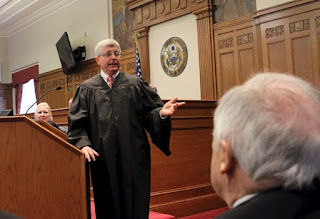The issue of bad faith claims in the first party benefits lawsuits was reviewed by the Eastern Federal District Court in the case of
Shea v. USAA, No. 17-4455 (E.D. Pa. July 25, 2018 Surrick, J.). The issues came before the court on the carrier's motion to dismiss.
Following the insured's involvement in a motor vehicle accident, the insured began to receive the benefit of her $100,000 in first party medical coverage under her own policy. At some point after a peer review, the carrier stopped the payment of the benefits. The Plaintiff filed a breach of contract claim, alleging violations of 75 Pa.C.S.A. Section 1797, and asserted bad faith conduct on the part of the carrier.
The court noted that there are conflicting Pennsylvania state and federal court decisions on the crucial issue of whether the MVFRL's provisions pertaining to peer reviews of first party medical benefits supplants claims for breach of contract, bad faith, and consumer protection law violations. It was noted that, to date, the Pennsylvania Supreme Court has not addressed the proper interaction of these causes of action in the first party context.
In his decision in this
Shea case, Judge R. Barclay Surrick of the Eastern District Federal Court lays out the issues and the law in great detail and in an easy-to-follow fashion.
The court rejected the defense contention that the MVFRL's peer review process preempts the existing common law remedy for breach of an insurance contract's implied covenant of good faith and fair dealing. The Court ruled that 75 Pa.C.S.A. Section 1797, which lays out the framework for first party benefits, does not prohibit an action for damages arising from an alleged breach of the insurance contract's implied covenant of good faith and fair dealing where those damages are otherwise available under the facts alleged.
In reviewing the conflicting line of cases on the issue of whether a Section 1797 peer review claim can be asserted in the same case as a Section 8371 bad faith claim, the
Shea court elected to side with what it termed as a growing number of cases that have fallen on the side of allowing both claims to be pled in a single action. In the end, the court in
Shea held that, where it is alleged that a carrier failed to follow the mandates of Section 1797, a plaintiff's remedies are not limited to those stated under Section 1797, but could also include the remedies allowed under the bad faith statute found at 42 Pa.C.S.A. Section 8371.
In the end, the court denied the carrier's motion to dismiss.
Anyone wishing to review this decision may click this Memorandum Opinion may click this
LINK.
I send thanks to Lee Appelbaum, writer of the excellent
Pennsylvania and New Jersey Insurance Bad Faith Case Law Blog, and from the Philadelphia law firm of Fineman, Krekstein & Harris for bringing this case to my attention.



















